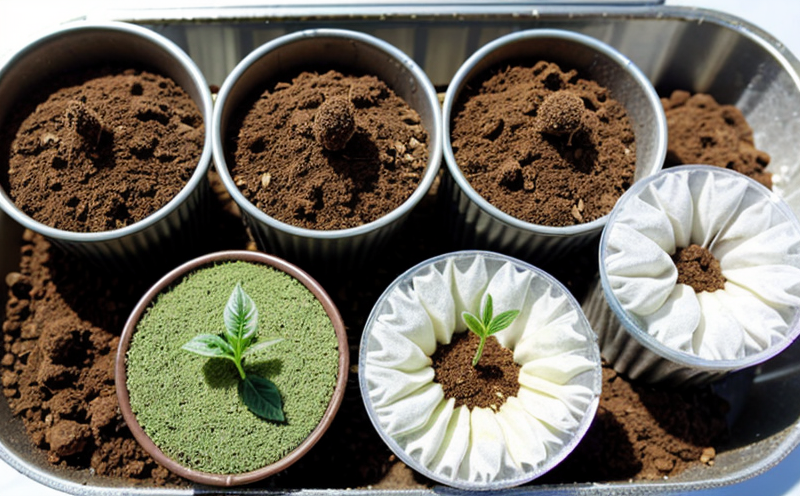Seed Genetic Purity Testing (DNA Marker Analysis)
In today’s competitive agricultural landscape, maintaining seed genetic purity is paramount for ensuring consistent crop quality and yield. DNA marker analysis provides a precise means of assessing the genetic composition of seeds to ensure they meet the desired standards. This service is particularly critical in breeding programs, where maintaining the integrity of varieties is essential.
Seed genetic purity testing involves identifying specific genetic markers that are unique to a particular variety. This allows for the differentiation between genetically similar varieties and ensures that any introduced genetic material does not compromise the intended characteristics of the seed. The process begins with the collection of seeds, which are then subjected to DNA extraction using advanced techniques such as phenol-chloroform or commercial kits.
The extracted DNA is amplified through Polymerase Chain Reaction (PCR) methods, followed by electrophoresis on agarose gels for visualization. The presence and absence of specific markers are identified using specialized software that compares the results against known reference sequences. This ensures a high degree of accuracy and reliability in determining genetic purity.
This service is especially valuable in hybrid breeding programs where maintaining the integrity of parent lines is crucial. By ensuring seed genetic purity, breeders can prevent unwanted gene flow that could lead to unintended characteristics or reduced performance. The use of DNA marker analysis also aids in intellectual property protection by verifying the authenticity of proprietary varieties.
The importance of this service extends beyond just breeding programs; it is equally critical for compliance with regulatory standards and international trade agreements. Many countries have stringent regulations regarding seed purity, and DNA marker analysis provides a standardized method to meet these requirements. This ensures that seeds are not only genetically pure but also legally compliant.
For quality managers and R&D engineers, this service offers a robust tool for monitoring and improving the genetic integrity of crops. By identifying and eliminating impurities early in the breeding process, they can enhance crop resilience to environmental stresses and improve overall yield. For compliance officers, it ensures that imported seeds meet international standards, thus avoiding potential legal issues.
Applied Standards
- ISO 3159:2007 – Procedures for the Identification of Crop Varieties by DNA Markers
- ASTM E2846-12 – Standard Practice for DNA-Based Testing to Determine Seed Identity and Purity in Agricultural Seeds
- EN 15370:2009 – Identification of Crop Varieties by DNA Fingerprinting
The application of these international standards ensures that seed genetic purity testing is conducted with the highest level of accuracy and reliability. Compliance with such standards provides confidence in the results, ensuring that the tested seeds meet the required specifications for both domestic and export markets.
Scope and Methodology
The scope of this service includes the identification of specific genetic markers that are unique to a particular variety. The methodology involves several key steps:
- Sample Collection: Seeds are collected from various sources, including breeding programs and commercial suppliers.
- DNA Extraction: DNA is extracted using advanced techniques such as phenol-chloroform or commercial kits to ensure purity.
- PCR Amplification: The extracted DNA undergoes PCR amplification to increase the quantity of target sequences for analysis.
- Electrophoresis: The amplified DNA is subjected to electrophoresis on agarose gels, where specific markers are visualized and identified using specialized software.
- Data Analysis: Results are compared against known reference sequences to determine the genetic purity of the seeds.
This comprehensive approach ensures that the results are accurate and reliable, providing valuable insights into the genetic composition of the seeds. The use of advanced instrumentation and software enhances the precision of the analysis, making this service highly effective in ensuring seed genetic purity.
Industry Applications
- Breeding Programs: Ensures that hybrid varieties remain true to type and that parent lines are maintained without unwanted gene flow.
- Compliance Monitoring: Guarantees adherence to regulatory standards for seed purity, ensuring legal compliance with international trade agreements.
- Trade Verification: Provides a reliable method for verifying the identity and purity of seeds being traded domestically or internationally.
- Innovation in Agriculture: Supports research and development efforts by providing accurate data on genetic composition, facilitating innovation in crop improvement.
- Ideal for Intellectual Property Protection: Ensures that proprietary varieties are not inadvertently contaminated, thus protecting the intellectual property rights of breeders.





